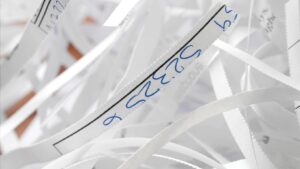March 20, 2024
How Often Should I Shred My Documents?

From credit card statements to tax returns and medical records, many of us have sensitive information that needs to be disposed of properly. That’s where shredding comes in – cutting paper into small pieces to ensure confidential information cannot be combined. But how often should you shred your documents? Is it enough to do it once a year during spring cleaning, or do you need a more frequent schedule? In this blog post, we’ll explore the importance of shredding documents and provide recommendations on how often you should do so to protect yourself from identity theft and other privacy breaches.
What Are Shredding Documents?
Shredding documents is a physical process that destroys paper records by cutting them into small pieces. This makes it difficult for anyone to read the information on the document, preventing identity theft and other privacy breaches. Many shredding service types are available, such as scheduled, one-time puge, and drop-off shredding. Each type caters to different needs and preferences.
Why Is It Important To Shred Documents?
It’s crucial to shred documents to protect your personal information from falling into the wrong hands. Identity theft has become increasingly common in recent years, with hackers and scammers finding ways to steal confidential information that can be found on paper documents. Shredding prevents unauthorized access to your personal information, reducing the risk of identity theft and fraud.
How Often Should You Shred Your Documents?
The frequency of shredding depends on several factors, such as the amount of paperwork you have, the type of information it contains, and the storage time required for legal or tax purposes. Generally, it’s recommended to shred documents at least once a year, but certain documents may require more frequent shredding. Here are some general guidelines for how often you should shred different types of documents:
Bank Statements
Shred monthly statements immediately once reconciled with your checkbook, but keep annual statements for at least three years in case of a tax audit.
Credit Card Bills
After checking for discrepancies, these can be shredded. However, if purchases are related to taxes, warranties, or insurance claims, retain them for your records.
Medical Records
Keep these for a minimum of a year in case of disputes, then shred them due to the sensitive information they may contain.
Pay Stubs
After reconciling with your annual W-2 form, shred these old paystubs to protect your financial and personal information.
Old IDs and Passports
These should be shredded once they expire to prevent potential identity theft.
Tax Records
The consensus is to hold onto these documents for at least seven years in case of potential audits, then shred them to secure your personal information.
Utility Bills
Shred these once the payment is verified on the next bill, typically within a month.
Junk Mail With Personal Info
Any unsolicited mail containing your personal information should be shredded immediately to prevent identity theft. This includes pre-approved credit card offers, bank statements, and other documents with personal information.
It’s also essential to shred any documents that you no longer need, such as old insurance policies, expired contracts, or outdated legal documents. These can often contain sensitive information that could be used for identity theft. Generally, if the document includes any financial or personal information, it’s best to shred it rather than throw it away.
Legal Requirements And Compliance
Certain legal requirements and compliance measures dictate the necessity for the proper disposal of specific documents. For instance, businesses dealing with customers’ sensitive information must comply with privacy laws such as What is the Gramm-Leach-Bliley Act (GLBA).
Additionally, certain industries may have specific regulations and requirements for document shredding based on the type of information they handle. For example, financial
The Fair and Accurate Credit Transactions Act (FACTA) mandates that businesses must properly dispose of information derived from consumer reports and records to protect against unauthorized access or use of that information. On the other hand, medical facilities must comply with the Health Insurance Portability and Accountability Act (HIPAA), ensuring the proper disposal of health information records.
Non-compliance with these regulations can lead to substantial fines and penalties, reputational damage, and loss of customer trust. Shredding documents is, therefore, not just a matter of protecting privacy but also a legal requirement for many businesses.
Conclusion
Shredding documents is crucial for protecting your personal information from falling into the wrong hands. While it may be tempting to hold onto old documents for sentimental or potential future use, it is essential to assess the need to retain and shred them if necessary. By following a regular shredded schedule and complying with legal requirements, you can safeguard your personal information and avoid potential identity theft or privacy breaches. PROSHRED® Minnesota offers secure and professional shredding services for individuals and businesses, ensuring your documents are disposed of effectively and compliant with legal regulations. Contact us today to learn more about our shredding solutions.
